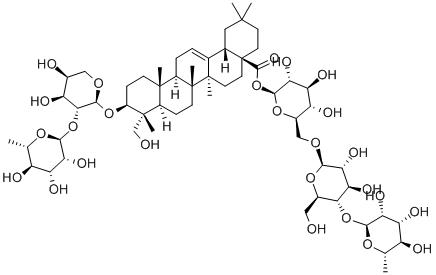Chinese team SVN new achievement: Ginkgo biloba extract can improve brain function after stroke
-
Last Update: 2018-01-02
-
Source: Internet
-
Author: User
Search more information of high quality chemicals, good prices and reliable suppliers, visit
www.echemi.com
On December 18, British time, BMJ, an international authoritative medical journal, and stroke & Vascular Neurology (SVN), a joint Journal of Stroke Society of China, published a new study, which revealed that Ginkgo biloba extract can improve the memory, cognitive and other neurological damage caused by acute ischemic stroke Moreover, it works better when used in combination with aspirin This discovery has been widely concerned by experts and scholars in the field of stroke The latest research was carried out by Professor Xu Yun of Nanjing Gulou Hospital, Medical College of Nanjing University, together with the research team of Nanjing First Hospital Affiliated to Nanjing Medical University and the First Affiliated Hospital of Suzhou University They confirmed that daily administration of Ginkgo biloba extract (GBE) and aspirin can improve memory and executive ability of patients with ischemic stroke, and the effect is significantly better than aspirin alone The Ginkgo biloba extract used in this study is a ginkgo ketone ester dispersible tablet with independent intellectual property rights in China Ginkgo biloba, known as the "living fossil" in the plant kingdom, has been used as a medicine in China for thousands of years, including promoting wound healing, relieving anxiety and depression In the United States, Europe and Canada, Ginkgo biloba extract (GBE) is also on the market as a food supplement in the form of over-the-counter The composition of GBE is complex, which varies with the age of the tree, the cultivated land and the male and female Ginaton (EGb761) is a listed Ginkgo biloba extract product developed by Dr Willmar Schwabe of Germany in the 1990s It contains 24% flavonol glycosides, 6% terpene lactones, 0.8% Ginaton lactones and a small amount of harmful substances (< 5? Ppm) - ginkgolic acid The Ginkgo biloba extract and ginkgo ketone ester dispersible tablet used by Professor Xu Yun's team in this study is a drug developed and produced by Jiangsu Shenlong Pharmaceutical Co., Ltd and is the fifth generation of Ginkgo biloba extract preparation Its raw materials and preparations have won a number of international and domestic patents On the basis of the original ginkgo preparation, the effective components of ginkgolide dispersible tablet were increased to 44% flavonol glycoside, 10% terpene lactone, 2.5% Ginkgolide B and < 2? Ppm ginkgolic acid Although some research data show that EGb761 can protect brain damage caused by ischemia by scavenging free radicals, the National Institutes of Health (NIH) thinks that there is no "conclusive evidence that Ginkgo biloba contributes to health" Moreover, the effect of GBE on ischemic stroke is not clear Now, this latest study by the Chinese team confirms that it does help with ischemic stroke Professor Xu Yun and his team recruited 348 patients (average age 64 years) from 5 hospitals in Jiangsu Province in a multicenter clinical trial followed up for 26 months They had an acute ischemic stroke in the past 7 days - the blood supply to the brain was blocked The most common cause of this disease was blood clot This kind of blockage will make the brain face the dangerous situation of lack of oxygen and nutrients, and eventually lead to brain cell damage, including memory damage, cognitive decline, motor loss and other side effects Tissue plasminogen activator (tissue plasma activator) is the gold standard method for the treatment of ischemic stroke at present It can alleviate brain injury by dissolving blood clots to dredge blood vessels However, this treatment must be carried out within 3 hours of the occurrence of stroke symptoms, and many patients cannot be treated in time within this "golden time" So scientists hope to find drugs to slow down brain damage Xu Yun's team believes that Ginkgo biloba extract is expected to become a potential candidate To test this hypothesis, they divided the subjects into two groups - one group was treated with "450 mg of Ginkgo bilobate dispersible tablets + 100 mg of aspirin" every day, and the other group only received "100 mg of aspirin" (aspirin is often used to prevent and treat stroke, which can prevent blood clotting) For 12, 30, 90, and 180 days, all participants were given a test called "Montreal cognitive assessment score" (MoCA) to assess their cognitive ability Compared with EGb761, the content of harmful substances in Ginkgo bilobate dispersible tablets used in the experiment is more trace (< 2? Ppm), and the content of other protective substances is relatively high Finally, 330 patients (18 dropped out during the period) insisted on completing the 6-month follow-up trial The results showed that the patients who received combination therapy had better performance in MOCA test, especially in memory and executive ability At the same time, on the 12th and 30th day of treatment, patients taking Ginkgo bilobate dispersible tablets and aspirin showed more improvement than those taking aspirin alone, including less nerve damage, language disorder and muscle weakness The researchers found that there was no significant difference in vascular status between the two groups, but the combination therapy had few side effects These results show that patients with stroke treated with "Ginkgo bilobate dispersible tablets + aspirin" have better improvement in memory, execution and neurological function In addition, safety data analysis showed that ginkgolide dispersible tablets did not increase the incidence of adverse events Xu Yun's team stressed that there are some limitations in this study, such as it is not a double-blind trial with short follow-up time, so more research needs to be invested to evaluate the long-term effect of Ginkgo biloba extract on stroke patients.
This article is an English version of an article which is originally in the Chinese language on echemi.com and is provided for information purposes only.
This website makes no representation or warranty of any kind, either expressed or implied, as to the accuracy, completeness ownership or reliability of
the article or any translations thereof. If you have any concerns or complaints relating to the article, please send an email, providing a detailed
description of the concern or complaint, to
service@echemi.com. A staff member will contact you within 5 working days. Once verified, infringing content
will be removed immediately.







